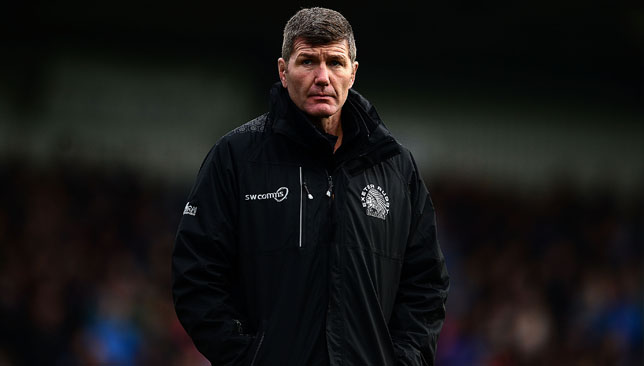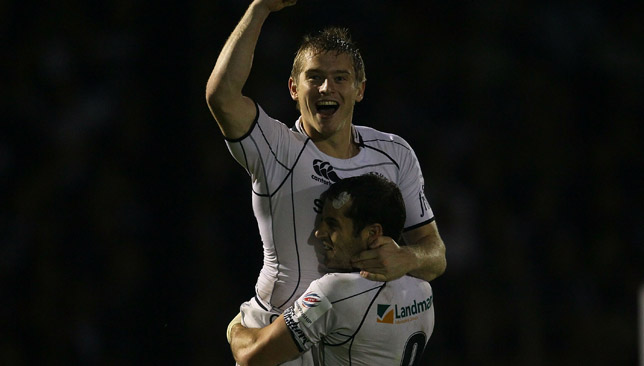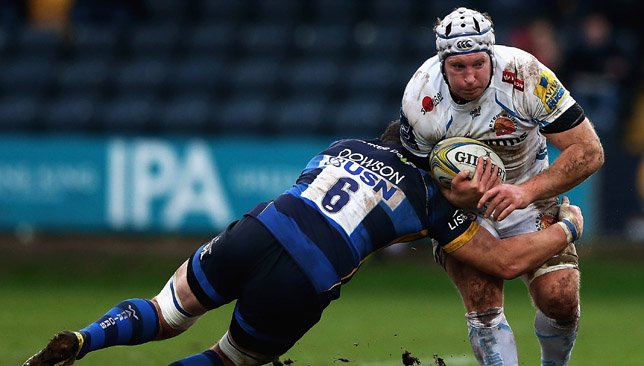
Exeter coach Rob Baxter stands on a platform within one of the greatest stadiums in England and when his chance comes he lifts the Aviva Premiership trophy and shakes it to the big grey sky.
There are nearly 80,000 people here and they’ve waited over 100 years for this moment.
And that’s it. The club rugby season passes away with the summer. Another campaign is over and Exeter are at the pinnacle of the English club game after years of heartache in the lower divisions.
Baxter – a man with a 21-year association with the club – has virtually transformed this side from Devon minnows to the biggest fish in English rugby since taking over as head coach in 2009.
However, the fairytale story hasn’t come true because of marquee Southern Hemisphere signings or rich Middle Eastern owners, but from creating a ferocious work ethic and willingness to win.
After a series of unsuccessful skirmishes, the Chiefs gained promotion to the Premiership in 2010 after beating Bristol in the Championship play-offs. The cries from Devon would surely have been heard all over Britain after years of near-misses as the club longed for a place in the top flight.
Since that sunny day in May eight years ago, it’s been a gradual but swift evolution, which has also included Heineken Cup qualification in 2014 and winning the LV=Cup the same year.

Exeter’s development saw them reach the Premiership final in 2016 – before losing to European champions Saracens in a one-sided final.
But away from the current days of promise and optimism, there were moments when it seemed Baxter’s side were just another average team in the early parts of the 2016/17 season.
Pressure had seemed to weigh heavily on their shoulders after reaching the league final – and a comprehensive home defeat to Clermont in Europe and a further four losses in six Premiership matches sparked early season crisis talks between players and management.
It was a 13-10 defeat to Bath in October 2016 that really sparked what would become one of the most promising campaigns in the league’s history. Exeter went unbeaten in their next 15 matches and secured a place in the league decider for the second successive year.
And then came the crowning moment. Against an in-form Wasps side, they claimed a famous extra-time win at Twickenham, capping an incredible journey to the peak of English rugby after seven years in the top tier with silverware.

It was fitting that the man who kicked 24 points to guide Exeter from the Championship to the top flight in 2010 was also pivotal to their Premiership triumph – a day after the seven-year anniversary of that play-off triumph over Bristol.
Irishman Gareth Steenson converted a penalty deep into extra-time to earn the Sandy Park outfit an historic win.
Fly-half Steenson – dubbed one of the ‘originals’ alongside Phil Dollman and Ben Moon – has seen more bad days than good during his 10 years playing on the south coast.
Although the 33-year-old’s injection of pace and skillset may not be at the heights of previous seasons, the Ulsterman is one of a stellar group of players who have bought into this culture instilled by Baxter that has seen the Chiefs evolve into one of the best teams in the game.
The head coach’s ability to identify players who fit his side without spending large amounts of money is impressive – and can be seen from signings drafted in steadily over previous seasons.
In 2015, he enticed Thomas Waldrom, Julian Salvi and Geoff Parling (now playing for Melbourne Rebels) to leave Leicester for Devon – moves which revived each players’ careers having stalled at Welford Road.

Waldrom, in particular, has been an instrumental addition to the club and has gone on to score a sensational 50 tries in 93 appearances.
Baxter also signed Olly Woodburn and the elusive Ollie Devoto from Bath, and second row James Short from Saracens – each player bringing a sprinkle of class to the ranks while adding to the fabric of a burgeoning club.
But away from the external recruitment, the academy is perhaps the focal point of the club’s glowing reputation on the international stage.
The system has produced totemic winger Jack Nowell, centre Henry Slade and the incumbent No8 Sam Simmonds – all of whom have sparkled on the international stage with England.
And it was the Red Rose’s win over Italy in the first round of the Six Nations that perhaps reflected their development with four players involved in the comprehensive victory over the Azzurri in Rome.
Star man Simmonds crossed the line for two tries, winger Nowell popped up for a late score, while Alec Hepburn and Harry Williams came on to win their first and seventh caps in the front row.
The battering lock-cum-flanker Don Armand earned a first cap during the summer tour of Argentina, and talisman Slade would be in Eddie Jones’ Six Nations squad only for a shoulder injury.
Seeing the seeds sown long ago now blossoming has only added to the enhanced reputation of the club – and the attractive brand of rugby they continue to play in England and Europe.
Although Exeter are out of the Champions Cup, they lead the Premiership and continue to be a financially shrewd side, with a great culture and vibrant style of play.
For a team once considered average, there is so much to admire about their rise to the top of English rugby.